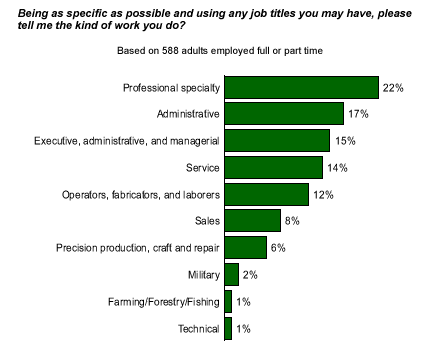They infest millions of homes across America. They slip into cupboards and pantries unnoticed, and ingest anything they find. They leave messes behind them wherever they go. But throughout this summer and fall, hundreds of thousands of them are streaming out of their lairs, unleashed on the world. And many Americans will miss them terribly.
Who are they? They're this year's high school graduates, crossing an important milestone on the way to being independent adults. Whether they're going on to college or starting jobs right away, many of them are thinking about the potential for their working lives. A recent Gallup Poll highlights the job categories that they may fall into now or in the near future.
Who's What
In an August 2003 survey*, Gallup asked employed American adults what kind of work they do. Nearly a quarter of working Americans, 22%, have jobs that fall into the category of "professional specialty," such as accountants, engineers, and scientists. Seventeen percent of working adults have "administrative" jobs, such as clerks or administrative assistants, making that the next most popular job category. "Executives, administrators, and managers" make up 15% of the working public. Fourteen percent have jobs in the "service" industry (such as in healthcare or food preparation), and 12% are "operators, fabricators, and laborers." Eight percent are in "sales," and 6% are in "precision production, craft and repair" (including construction workers and mechanics).

How'd They Get There?
As everyone knows, having a college degree or two is necessary for many jobs, especially those falling into the "professional specialty" category. Nearly two in three members of the professional specialty category have college degrees, including 40% who have an advanced degree. Forty percent of executives and managers have a college degree, and 80% have at least some college education.
Looking at the results a little differently, more than half of those with a postgraduate education fall into the professional specialty category (55%), with 16% holding jobs as executives or managers. Those with a four-year college degree (but no graduate education) are most likely to work in a professional specialty (24%), followed by an executive or managerial position (18%), an administrative position (15%), or a sales job (14%). Members of the group of working Americans with some college education (but who do not have a four-year degree) are most likely to be working in administrative jobs (22%), executive or managerial positions (18%), a professional specialty (15%), or in the service industry (14%). High school graduates with no college education are most likely to be working as operators, fabricators, or laborers (24%) and in service (18%) or administrative jobs (17%).
Personal Identification
As parents watch their kids stream out of their houses and into their working lives, the hope is that they find jobs that have meaning for them beyond their paychecks. Gallup data offer some solace in this regard; 56% of employed adults say their jobs give them a sense of identity, although a substantial percentage of them -- 43% -- say their jobs are "just what they do for a living."
However, the results are quite stark when looking at responses by educational attainment. Eighty-three percent of working Americans who have a postgraduate degree say their job gives them a sense of identity, compared with 58% of college graduates (and no postgraduate education), 50% of those with some college education, and only 47% of those with a high school education or less. In fact, a majority (52%) of those who did not attend college describe their jobs as "just what they do for a living."

Bottom Line
The reason most colleges allow students to register their majors as undecided is because many kids don't know what they want to do. But most Americans spend 40 hours or more a week, for 40 or more years, at work. Most prison terms don't last that long, and a poorly chosen career can feel like one. Kids need to know their options and opportunities before they commit -- including whether that job will be "just something I do" or something that gives them a sense of identity.
*Results are based on telephone interviews with 588 adults employed full or part time, conducted Aug. 4-6, 2003. For results based on the total sample, one can say with 95% confidence that the margin of sampling error is ±4 percentage points.